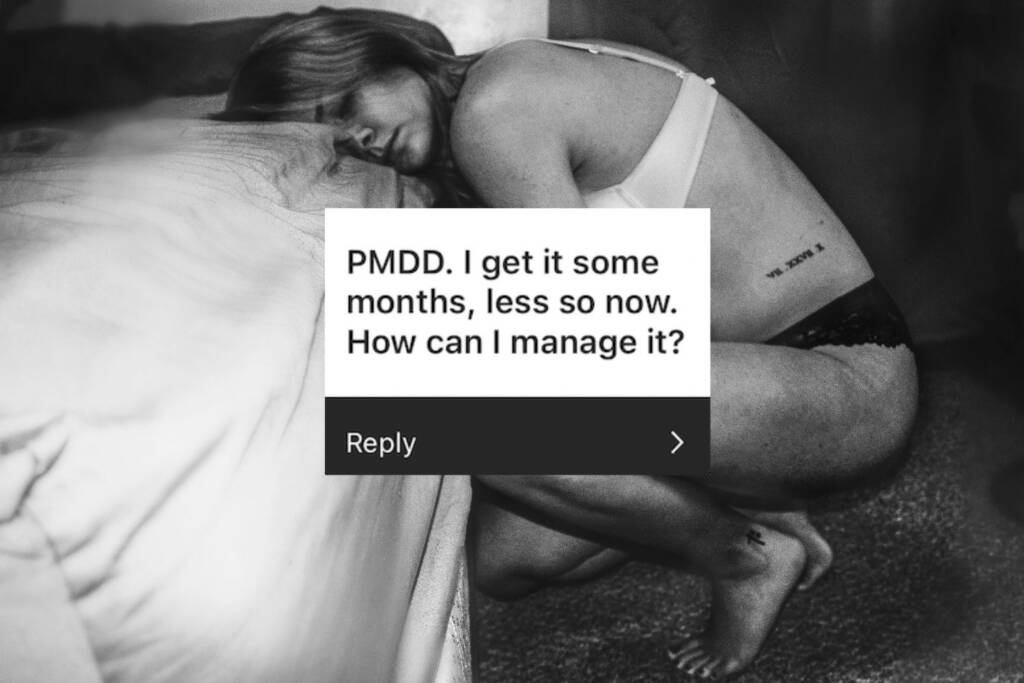Writing by Jane Bennett // photograph by Sydney Sims
 PMDD is a serious and difficult condition affecting 3 to 8 percent of women and causes severe premenstrual depression, irritability or anxiety. I feel for you. And yes, it can vary month by month. And absolutely, there are ways you can manage symptoms and help smooth out the big hairy bumps.
PMDD is a serious and difficult condition affecting 3 to 8 percent of women and causes severe premenstrual depression, irritability or anxiety. I feel for you. And yes, it can vary month by month. And absolutely, there are ways you can manage symptoms and help smooth out the big hairy bumps.
The first thing I’d say is to recommend an excellent book by naturopathic doctor Lara Briden called Hormone Repair Manual. It will explain a lot and give you sensible, evidence-based things you can do that will really help, and possibly even get you feeling enthusiastic about your power to make the most of the good juju your hormones can give you.
If you haven’t already, I suggest you seek professional guidance to have your PMDD diagnosed, or find out if it is more of a heavy-hitting PMS – there is a difference, and therefore different ways of treating and managing.
If you’ve done that already and we are definitely talking about PMDD know that anti-depressants are often prescribed to help alleviate the depression, anxiety and mood disorder. It’s not my expertise or job to prescribe these, and you may or may not be happy to take them. Whether alternatively, or in addition, there are valuable diet, exercise and lifestyle tweaks that can really help you in your quest. I’ll outline some general principles here as a solid place to start but again I recommend Lara’s book as a way to get a lot more detailed info and understanding, and as a way to observe your own patterns and figure out what will work for you.
Stress
Chronic stress is the number one disrupter of hormone balance. Adrenaline (your fight or flight hormone) blocks your progesterone receptors and forces your adrenal glands to steal progesterone to make cortisol. In doing so creates an imbalance in our cycling hormones and will disrupt cycles in all sorts of ways, including exacerbating PMS and PMDD. We all have stressors and if bells are ringing for you around the words *chronic stress* all I can suggest is that you have a good, clear-eyed look at your stressors and seriously consider what you can change. And prioritise some lovely regular destressing, like a walk and a massage.
Diet
Our bodies are all different with different sensitivities and strengths, diet and nutrition-wise. That said there are some general principles that will help you manage PMDD: reduce sugar (a lot), reduce alcohol (to occasional), reduce or eliminate wheat and dairy, and replace bad oils with good. Start there and see what happens.
Exercise
Move in ways you enjoy. Regularly. As a priority. Get breathless at least a few times a week. Stretch and discover the delicious pleasures of a good stretch, whether while you wait for the kettle to boil or during a whole sublime class. Get excited about the feeling of power and lightness you can grow through weight-bearing exercise.
Supplementation
For a precise prescription of supplements for your specific needs it can certainly save you time, money and extended suffering to see a skilled functional medicine practitioner or naturopath for PMDD. That said there is good evidence that vitamin B6, Magnesium, Selenium and the herb Vitus agnus-castus (or Chastberry) can be very beneficial for this condition.
While PMDD is a serious condition requiring serious attention, there is a lot you can do, especially with the help of sympathetic and skilled health practitioners, and support to take change of your own journey. Good luck!
Good luck,
Jane






